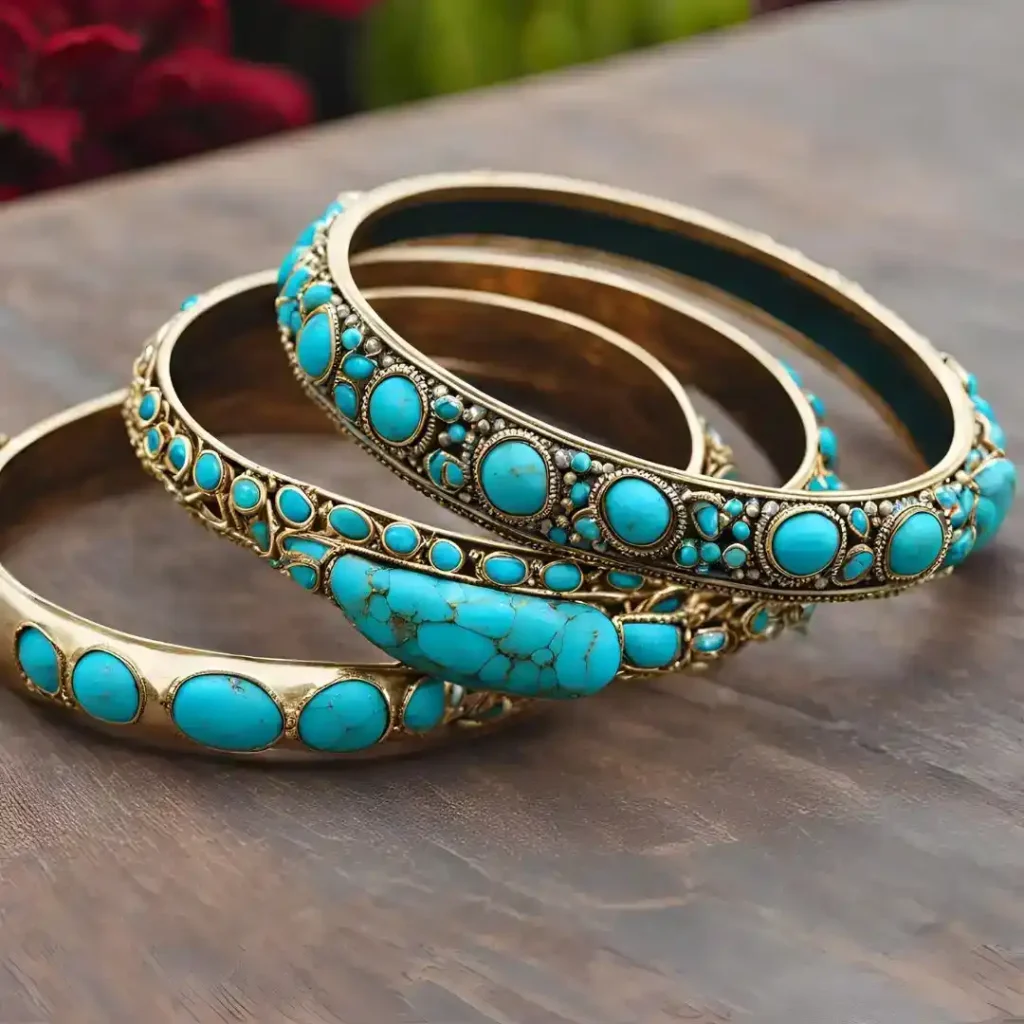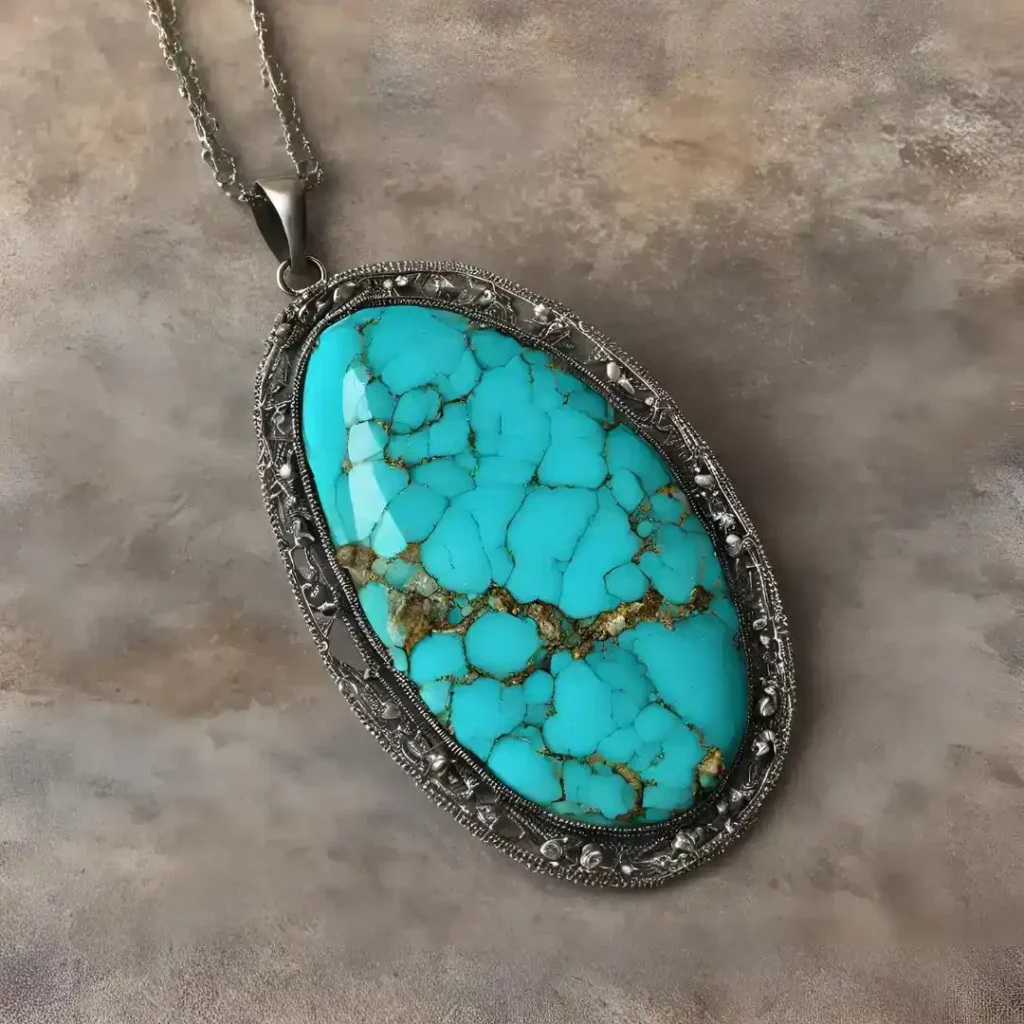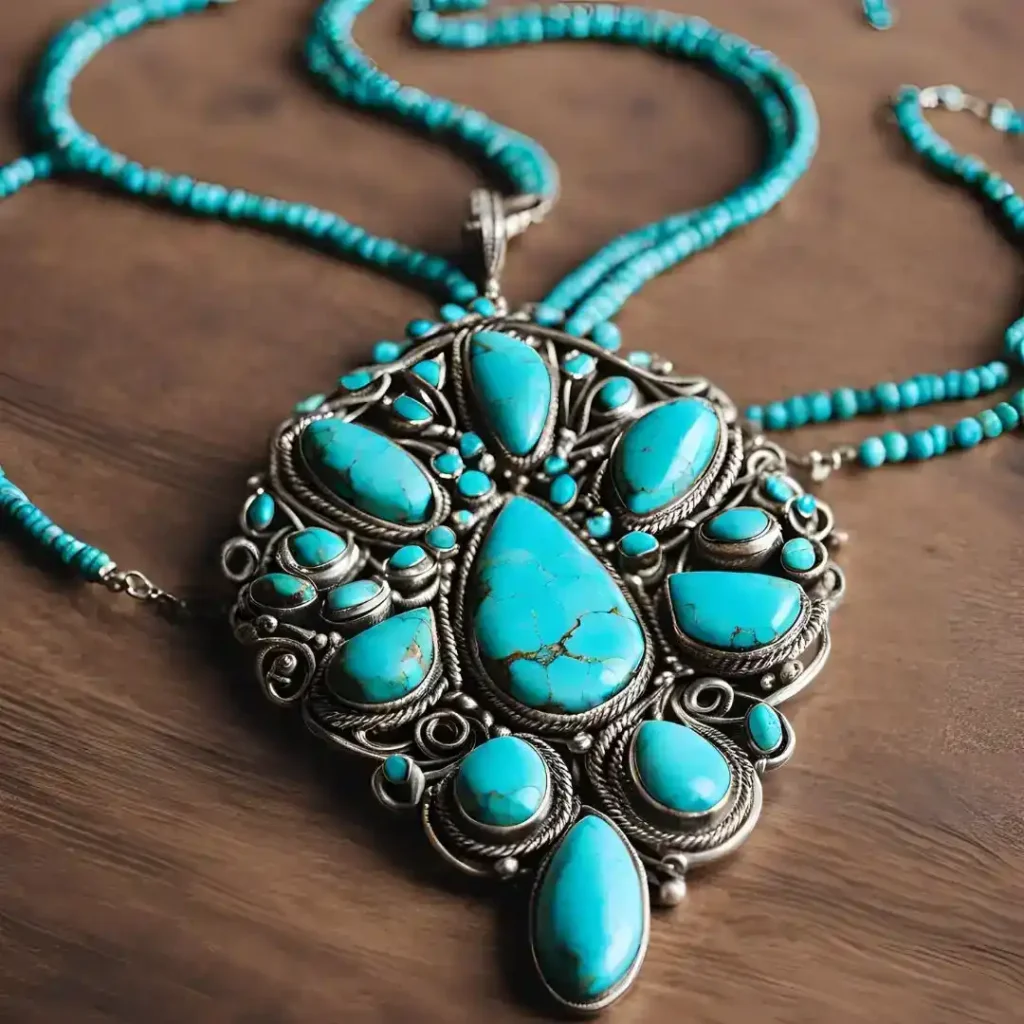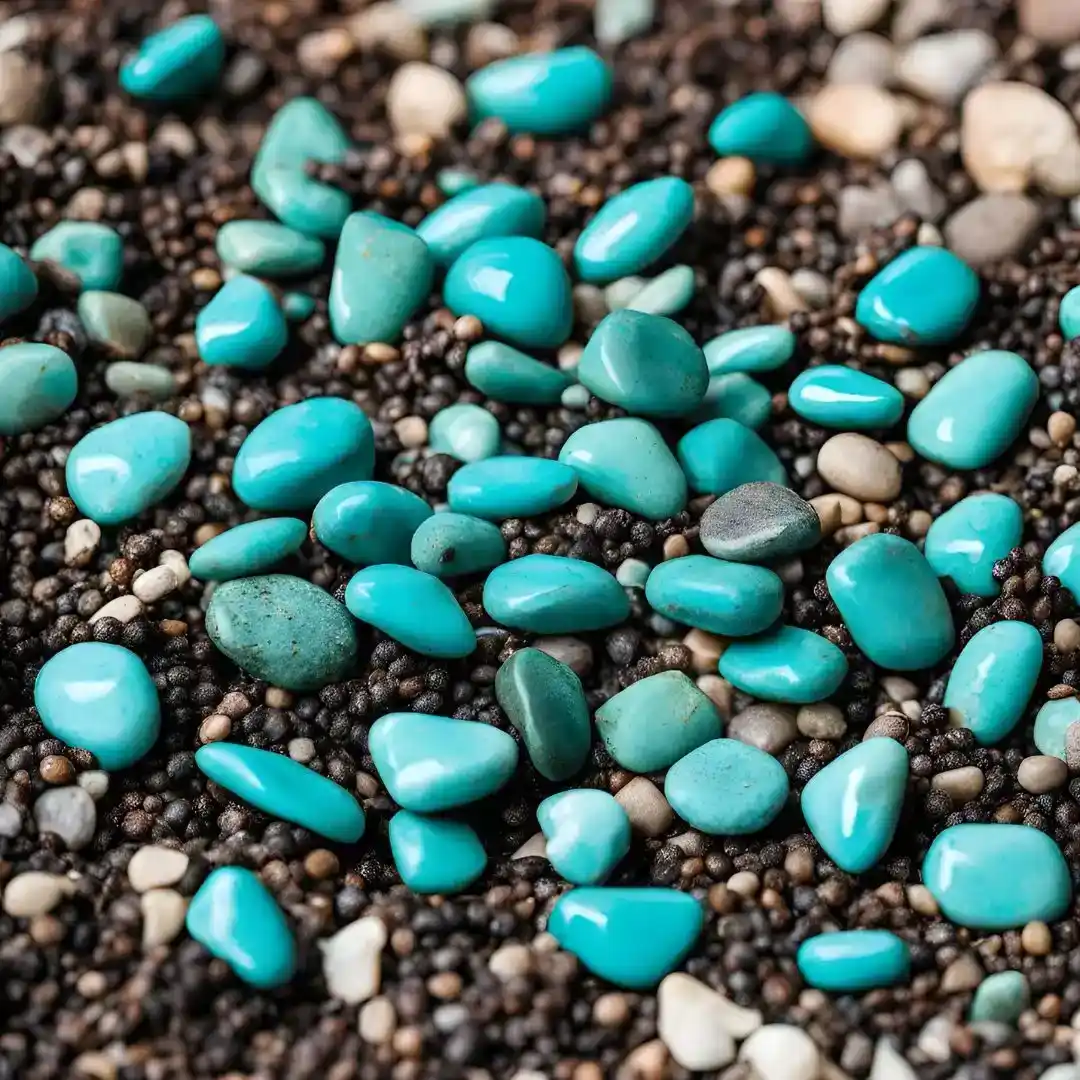Turquoise, one of the oldest gemstones, has been cherished for its beautiful and striking blues and greens, making it a popular choice for jewelry and decorations.
Beyond its visual appeal, turquoise is known for its potential physical, emotional, and spiritual benefits when worn. However, not everyone is advised to wear this stone.
The history of turquoise spans various cultures and traditions, but it’s essential to understand that it’s not universally safe to wear for all people.
Who should not wear turquoise stone? This is a question often asked by those intrigued by the stone’s allure.
While turquoise is known for its beauty and is widely used in various forms, it’s crucial to be aware that not everyone may experience the positive aspects of this stone.
Some may find that turquoise does not align with their personal energy or may not be suitable for their specific life circumstances.
Also Read: 14 Side Effects Of Magnetic Bracelets
What Is Turquoise?
Turquoise, a gemstone with a legacy as rich as its hues, has long been revered for its ability to ward off evil and negativity.
Originating from Turkey and historically known as the Turkish stone, it has become a symbol of wealth and a popular choice in jewellery.
Known for its astrological benefits, turquoise is believed to align the chakras and offer protection against injuries, violence, accidents, and even infidelity.
This stone is not just a pretty accessory; it’s a shield, absorbing negative energies and vibrations that the wearer might encounter.
With its myriad shades and colours, each piece of turquoise is unique, and consulting an expert astrologer is advised to determine the appropriate size and colour for you.
Although hard, turquoise is somewhat brittle, and it’s said to change colour in response to the negativity around, even fading when the wearer is at the verge of dying.
In the realm of astrology, each planet is linked to a specific gemstone and zodiac sign. Turquoise is aligned with the planet Jupiter, serving as a substitute for the Yellow Sapphire gemstone.
It is the birthstone for those born in December and is particularly lucky for Sagittarius. Wearing turquoise is believed to make a person wiser and more understanding of both self and others.
For those experiencing the ill-effects of Jupiter or any other planet in their birth chart, turquoise can bring clarity, enhance communication, and foster compassion.
It’s especially beneficial for those in acting, writing, painting, and other financial and fame-related professions.
Also Read: Black Crystal With White Spots
Is Turquoise Safe To Wear?
Turquoise, a beloved crystal, often raises the question: Is it safe to wear or carry? This gem contains copper and aluminum, elements that contribute to its unique color.
When it comes to crystals, special care is needed. It is advised to put turquoise on your left side and to have it regularly cleansed, preferably in water.
However, avoid saltwater as it can absorb chemicals, causing the stone to lose its shine and color. This precaution extends to its physical appearance; it’s best not to wear turquoise while taking a shower or bath.
Emotionally and spiritually, turquoise is known for being uplifting and beneficial for well-being. It demands attention to your emotions and mood, bringing serenity, calm, and peace.
This stone is excellent for warding off negative energy and helps to cleanse and clear the throat chakra, enhancing communication and fostering spiritual growth.
Physically, turquoise acts as a multi-purpose healer, helping to regulate and oxygenate the blood and system, making it a protective and lucky stone, especially during travel.
In conclusion, while turquoise is generally safe and beneficial to wear, it requires specific care and attention to maintain its physical and metaphysical properties.
Whether you’re seeking emotional balance, spiritual growth, or physical healing, this versatile gemstone can be a valuable addition to your collection, provided you handle it with care.
Also Read: Achieve Straight A’s With These 27 Best Crystals For Good Grades
Who Should Not Wear Turquoise Stone?
Turquoise, a captivating crystal and gemstone, is often sought after for its aesthetic and energetic qualities. Yet, the question arises: who should not wear or use this stone in their life?
Turquoise, like many crystals, can have negative side effects if it enters into conflicts with an individual’s energy. It’s generally safe for most people, emotionally, physically, and spiritually, but there are exceptions.
Those with allergies or sensitivity to copper or aluminum, components found in turquoise, might experience adverse reactions when it contacts the skin, especially in jewelry or its raw form.
Energetically, turquoise is known to absorb and neutralize negative energy, but it requires the wearer to pay attention to how they are drawn to the stone.
If you notice a significant change in how the stone affects you, trust your intuition and assess your circumstances. It may be necessary to re-cleanse the energy of the gemstone or consider if it truly resonates with you.
While this article doesn’t label turquoise as dangerous, it’s important to be mindful that not all crystals are suitable for everyone.

7 Negative Effects Of Turquoise Stone
Turquoise is generally safe, but like all crystals, it can have side effects and negative reactions in some healing practices; these are uncommon and highly subjective.
1. Skin Irritation
Skin irritation and inflammation can be a reaction to wearing turquoise jewelry, especially in those with sensitive skin.
The aluminum and copper in turquoise, along with treatments like dyes, oils, wax, or resin, may trigger physical reactions.
Even a seemingly harmless pearl ring can sometimes have unforeseen side effects when paired with turquoise, underscoring the importance of being aware of your skin’s response to different materials.
2. Headaches
Wearing turquoise, a powerful gemstone associated with the throat chakra and third eye chakra, can sometimes cause headaches.
These can stem from imbalances in the pineal gland or pressure in the forehead area. While turquoise is a revered crystal, it’s essential to use it in moderation and be mindful of your tolerance levels.
Some people may experience these symptoms as manifestations during meditations, requiring adjustment in how they engage with this stone.
Also Read: 15 Best Crystal Combinations For Sunstone For Peace and Prosperity
3. Insomnia/Restlessness
Insomnia or restlessness might occur when using turquoise near the third eye area, particularly for those sensitive to the stone’s energy.
This gemstone is linked to intuition, insight, and awareness, which can be overwhelming when placed in a space like a bedroom or used to meditate before sleep.
To maintain clarity and a peaceful sleep journey, it’s advisable to find a balance in how and when to engage with turquoise, especially near bedtime.
4. Nausea
Wearing turquoise can sometimes cause nausea due to its detoxifying and protective properties. As it works to cleanse negative energy and transmute it, the emitted energy from the user may react with the crystals or gemstones.
When not properly purified, turquoise can inadvertently amplify toxic energy on the body’s surface, leading to feelings of nausea. It’s advised to use turquoise sparingly in such cases.
5. Feeling Overwhelmed
Crystals and gemstones are potent emotional stimulants, and turquoise is no exception. It can be overwhelming, especially if it’s not suitable or compatible with your energy.
Some people are naturally more drawn to certain gemstones, and an emotional reaction to turquoise may indicate a misalignment with the body’s specific current emotional state. This can often clash with other stones like kyanite.
6. Nightmares
Nightmares can be an unexpected side effect of sleeping with turquoise, a crystal known for its properties of forgiveness and acceptance.
Those seeking answers to deep-seated regrets may find that their subconscious mind reacts vividly during sleep.
While turquoise is often used in crystal healing for its intuitive properties, it can intensify inner work, making the healing energy process more painful.
7. Discomfort
Discomfort while wearing turquoise can be a blessing in disguise, signaling internal reactions and turmoil.
As turquoise interacts with chakras and energy centers in the body, especially the throat chakra and third eye, it can make one feel uncomfortable.
This is because the crystal might be highlighting issues in these energy centers that need attention.
Also Read: How To Cleanse And Charge Pyrite For Maximum Benefits

4 Safe Turquoise Alternatives: Safe To Wear
Exploring safe alternatives to Turquoise, there are various crystals with similar properties that make a great addition to your crystal list to wear.
1. Amethyst
Amethyst, a powerful and ancient crystal, is an excellent alternative to Turquoise for healing and protection.
It helps to activate higher consciousness, providing clearer insights and increased well-being by revealing underlying causes of behaviors, habits, and patterns.
Its calming and peaceful energy makes it a lighter and safer choice, influencing and affecting the ability to think and understand.
2. Moonstone
Moonstone, another soothing alternative to Turquoise, aids travelers by bringing luck and protection.
Its safe alternative nature is enhanced by its power to heighten intuitive abilities and emotions, encouraging one to explore different perspectives and release them in a healthy way.
3. Selenite
Selenite balances the heart chakra and aids in communication, making it an effective alternative to Turquoise.
This self-cleansing crystal can cleanse, purify, and amplify the energy of other crystals, reducing emotional and spiritual side effects. Its light and angelic qualities support the spiritual journey.
4. Rose Quartz
Rose Quartz, known for its unconditional love, is a popular and effective alternative to Turquoise.
It promotes self-love and emotional healing, balancing emotions and relaxing the body.
Its ability to clear emotional blockages makes it a powerful, recognized, yet humble choice for enhancing well-being.
Also Read: The Dark Side Of Moonstone: 9 Side Effects Of Moonstone Revealed

FAQs About Who Should Not Wear Turquoise Stone
1. Is Turquoise Dangerous?
While turquoise is a beloved gemstone in jewelry, proper care is essential. Treatments such as stabilization, dyeing, waxing, or oiling enhance its color and durability. However, exposing turquoise to heat can lead to discoloration and surface damage, so handling it with care is crucial.
2. Is Turquoise Deadly?
Turquoise itself is not inherently deadly, but there is a concern regarding copper toxicity, which can affect the liver and kidneys. This is a factor to consider, especially for those with sensitivities to these elements.
3. Is Turquoise Toxic?
Unlike quartz gemstones like agate, amethyst, onyx, and jasper, which create toxic dust due to their silica content, turquoise doesn’t pose the same risk. However, it may contain free silica. Opal, consisting of amorphous silica, is slightly toxic by inhalation, but this is less of a concern with turquoise.
4. What Zodiac Is Turquoise Good For?
Turquoise is particularly beneficial for those under the Sagittarius zodiac sign. It aligns well with the ruling planet Jupiter in astrology. Being the birthstone for December, it’s thought to bring good luck to those born in this month.
5. Can Turquoise Be Worn By Anyone?
Yes, turquoise can generally be worn by anyone. It’s a versatile and attractive stone, often used in rings, pendants, and other pieces of jewelry. Its appealing blue-green color has made it popular for centuries.
6. What Is The Birth Month For Turquoise?
Turquoise is the birthstone for the month of December. It’s one of the first gemstones to be mined and is admired for its intense and pure color and natural form.
7. Does Turquoise Attract Money?
In Feng Shui, turquoise is known for its healing properties and its ability to attract wealth and energy. It’s recommended for the office to boost performance and is also seen as a stone that aids in communication. Its presence on the dinner table can help calm debates, exerting a calming influence.
8. What Not To Do With Turquoise?
Turquoise is a unique stone that can be discolored by chemicals, cosmetics, skin oils, and even perspiration. It’s vital not to clean your turquoise jewelry with steam or ultrasonic cleaners as it dissolves slowly in hydrochloric acid and can damage the surface appearance. Instead, use warm, soapy water. Be mindful that some turquoise is treated to enhance its look.
9. What Chakra Is Turquoise For?
Turquoise is closely connected to the throat chakra, which is the bridge between the heart and the head, known as the fifth chakra. This stone supports the balance and expression of this important energy center.
10. Does Turquoise Have Healing Powers?
Known for its healing properties, turquoise is used in alternative medicine to bring calmness, clarity, and emotional balance. It’s the birthstone for December and is celebrated for the 11th wedding anniversary, symbolizing its deep healing influence.
11. Does Turquoise Have A Power?
As a stone and talisman, turquoise possesses healing properties. It’s believed to balance the blue throat chakra, enhancing communication abilities and providing resistance to viruses, sore throats, and allergies.
12. What are Benefits of Turquoise Stone?
The benefits of turquoise stone are vast. It fosters understanding among partners, removes negative and evil energy, boosts the spiritual state, and promotes self-love. It’s also helpful in overcoming issues like depression, high BP, alcoholism, and infection.
13. What Emotion Is Turquoise?
Turquoise is a calm, friendly, and cheerful color, radiating the tranquility of blue, the growth of green, and the vitality of yellow. It aids in clear thinking and promotes relaxation.

Final Thoughts
The decision of who should not wear turquoise stone is a nuanced one, grounded in understanding its safe use and potential side effects.
While Turquoise is a revered gemstone, it’s crucial to assess its compatibility with your personal energy and the specific influences it may have on your spiritual journey.
Each individual’s experience with turquoise can vary, and it’s important to be mindful of how it affects and influences your self-knowledge and the experiences you encounter.
For those who find turquoise unsuitable, exploring alternatives such as Amethyst, Moonstone, Selenite, and Rose Quartz can provide a safer and more harmonious path to spiritual and emotional well-being.
You May Also Like To Read
- Carnelian and Rose Quartz Together
- Unlock The Mystical Power Of Labradorite And Moonstone Together
- 15 Best Crystal Combinations For Sunstone For Peace and Prosperity
- Onyx Stone Benefits: The Secret To Health And Harmony
- Why Did My Rose Quartz Turn White: Discover Why It Loses Color!
- How To Cleanse And Charge Pyrite For Maximum Benefits
- Blue Mood Ring Meaning Revealed: Boost Your Emotional Intelligence Today
